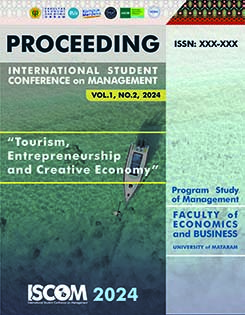EXCHANGE RATE STABILITY OF THE RUPIAH, INTEREST RATES, MONEY SUPPLY, FOREIGN EXCHANGE, AND DINAR (GOLD) ON INFLATION IN INDONESIA
Keywords:
Inflation, Exchange Rate, Interest Rate, Money Supply, Foreign Exchange, Dinar (Gold)Abstract
Introduction : This research analyzes the relationship between inflation and economic variables using the ARDL (Autoregressive Distributed Lag) model, with an emphasis on both long-term and short-term evaluations.
Research Methods : In this study, the analysis method used is Auto Regresive Distributed Lag (ARDL) analysis. Where the ARDL model is an analysis using one or more past data from dependent variables among the explanatory variables by involving data at present time and past time from explanatory variablesFinding/Results : In the short-term analysis, the variables INTEREST_RATE, EXPORT, and M2 show significant impacts on INFLATION. EXPORT has a significant influence with varying lag effects. Conversely, the variables NTR, DINAR, and FOREIGN_EXCHANGE do not have a significant impact in this model. In the long-term analysis, the INTEREST_RATE variable has a coefficient of 1.002155 with a p-value of 0.0366, indicating a positive and significant effect on INFLATION. An increase of one unit in INTEREST_RATE is associated with an increase in INFLATION of approximately 1.002 units. Additionally, EXPORT also shows a significant long-term relationship with INFLATION, although its coefficient is small and the p-value is 0.0335. On the other hand, the variables NTR, DINAR, FOREIGN_EXCHANGE, and M2 do not show significant long-term effects, although some approach significance.
References
Antonio, M. S. (2021). Bank Syariah, Dari Teori Ke Praktik. Gema Insani Press & Tazkia Cendikia.
Eichengreen, Barry. (2022). Globalizing Capital: A History of the International Monetary System (2nd ed.). In Princeton University Press.
Fatoni, A. (2022). Pengaruh Ketidakpastian Ekonomi Terhadap Stabilitas Perbankan Syariah Di Indonesia. Jurnal Ilmiah Ekonomi Islam, 8(3), 2903. https://doi.org/10.29040/jiei.v8i3.5385
Gali, Jordi, & Gambetti, Luca. (2024). Inflation Dynamics and Monetary Policy: The Fisher Effect Revisited. American Economic Review, 114(8), 24. https://doi.org/10.1257/aer.114.8.2401
Gujarati, D. N. (2016). Dasar-Dasar Ekonometrika (Edisi Keti). repo.iainbatusangkar.ac.id. https://repo.iainbatusangkar.ac.id/xmlui/handle/ 123456789/2082.
Huda, nurul dkk. (2008). Ekonomi Makro Islam Pendekatan Teoritis. Kencana Pranada Media Group.
Iryanto, M., Abubakar, A., & Inat, F. (2023). Konsep Pengendalian Inflasi dalam Perspektif Al-Qur’an. AL QUDS : Jurnal Studi Alquran Dan Hadis, 7(2), 308. https://doi.org/10.29240/alquds.v7i1.5416
Khan, Mohsin S., & Senhadji, A. S. (2023). Inflation and its Determinants: A Review of Recent Evidence. Journal of Monetary Economics, 120, 45–68. https://doi.org/10.1016/j.jmoneco.2023.01.002
Marlianda Bolung, D., Syafri, & Ratnawati, N. (2023). Analisis Pengaruh Tingkat Inflasi, Kurs, Jumlah Uang Beredar, Ekspor, Dan Impor Terhadap Cadangan Devisa Indonesia. Jurnal Ekonomi Trisakti, 3(1), 249–258. https://doi.org/10.25105/jet.v3i1.15404
Meissner, C. M., & Sargent, T. J. (2024). Gold standards and financial stability: Lessons from the past. The Review of Economic Studies, 91(1), 123. https://doi.org/https://doi.org/10.1093/restud/rdt040
Mukhlis, I. (2021). Ekonomi Moneter dan Stabilitas Makroekonomi. Gramedia Pustaka Utama.
Ratri, D. A., & Munawar. (2022). Analisis Pengaruh Suku Bunga (Bi Rate), Jumlah Uang Beredar Dan Ekspor Terhadap Inflasi Di Indonesia Pada Masa Pandemi Covid-19. Journal of Development Economic and Social Studies, 1(1), 28–70.
Rogoff, K. (2022). The Curse of Cash: How Large-Denomination Bills Aid Crime and Tax Evasion and Constrain Monetary Policy. Princeton University Press.
Saibuma, P., Anggeliani, F., & Datu, P. A. (2022). Analisis Pengaruh Cadangan Devisa Dan Suku Bunga Terhadap Nilai Tukar Rupiah. PROSPEK : Jurnal Program Studi Pendidikan Ekonomi, 3(2), 262.
Salmy Edawati Yaacob. (2012). The reality of Gold Dinar application in Malaysia. Advances in Natural and Applied Sciences, 6(3), 341–347.
Suwarno, I., Putra, I. M. W., & Sutapa, I. N. (2021). Pengaruh Inflasi, Nilai Tukar Rupiah (USD), Suku Bunga Dan Ekspor Terhadap Cadangan Devisa Negara Indonesia Tahun 2009-2019. Jurnal Riset Akuntansi Warmadewa, 2(1), 48–5. https://doi.org/htps://doi.org/10.22225/jraw.2.1.2933.48-53
Taylor, J. B. (2023). Economic Policy and the Financial Crisis: A Comprehensive Analysis. Oxford University Press.
Temin, P. (2023). The gold standard and the Great Depression: A reappraisal. Economic History Review, 76(3), 917. https://doi.org/http//org/10.1111/ehr.13016
Widiarsih, D., & Romanda, R. (2020). Analisis Faktor-Faktor yang Mempengaruhi Inflasi di Indonesia Tahun 2015-2019 dengan Pendekatan Error Corection Model (ECM). Jurnal Akuntansi Dan Ekonomika, 10(1), 119–128. https://doi.org/10.37859/jae.v10i1.1917




